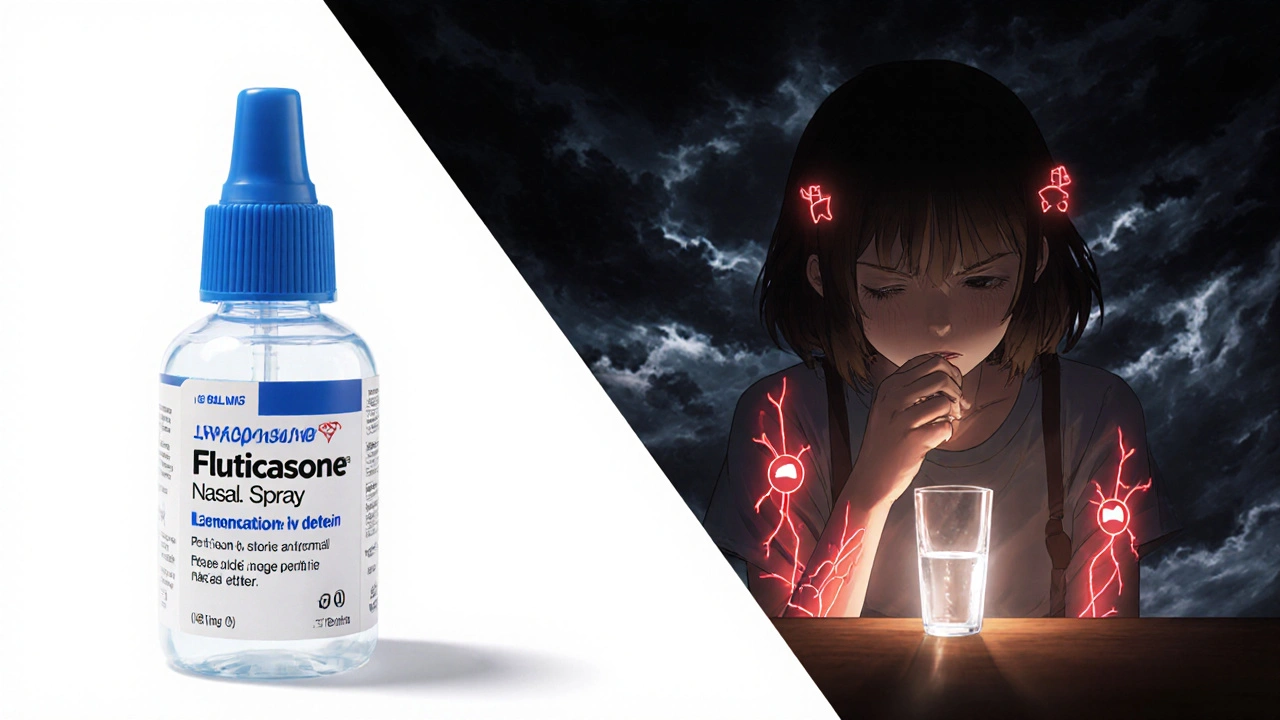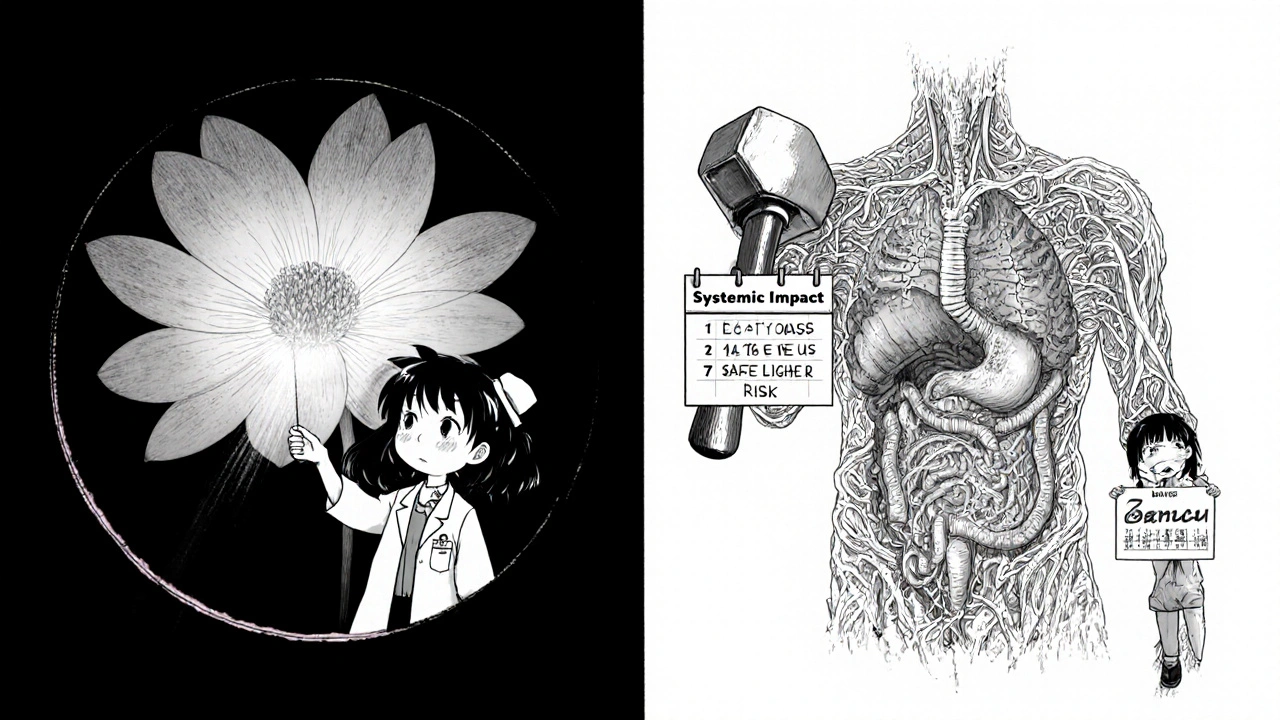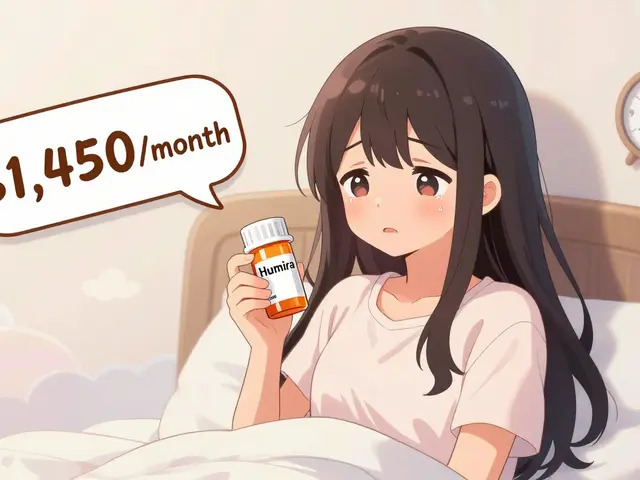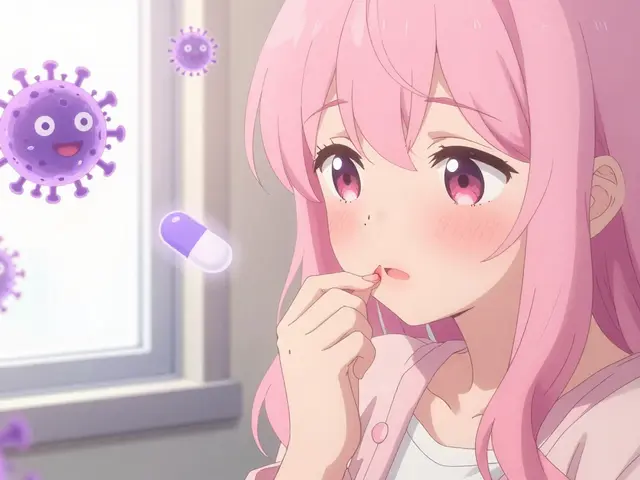Most people don’t realize that just because two medicines contain the same active ingredient, it doesn’t mean they work the same way. Take fluticasone - you can get it as a nasal spray or as a pill. But using one instead of the other isn’t just a matter of preference. It’s a major difference in how your body handles the drug, what it treats, and what side effects you might face.
Fluticasone Nasal: Targeted Relief for Allergies and Sinus Issues
Fluticasone nasal spray is designed to sit right where you need it: inside your nose. When you spray it, the medicine coats the lining of your nasal passages. That’s where allergy symptoms like sneezing, runny nose, and congestion start. The drug works locally, reducing swelling and blocking the chemicals that trigger those reactions. Because it’s applied directly, your body absorbs very little of it into your bloodstream.
Doctors prescribe fluticasone nasal spray for allergic rhinitis - whether it’s seasonal pollen or year-round dust mites. It’s also used for chronic sinus inflammation and nasal polyps. Most people use one or two sprays in each nostril once a day. It doesn’t work right away - you need to use it daily for a few days to weeks before you feel the full effect. But once it kicks in, it’s one of the most reliable ways to keep nasal symptoms under control without reaching for antihistamines every day.
Side effects? Mostly mild. Some people get a dry or irritated nose, occasional nosebleeds, or a bad taste. Serious side effects are rare because so little of the drug enters your system. In fact, studies show that even with daily long-term use, fluticasone nasal spray doesn’t significantly affect blood sugar, bone density, or adrenal function in most adults.
Oral Steroids: Powerful, But Systemic
Oral steroids - like prednisone or methylprednisolone - are pills you swallow. Once they’re in your stomach, they get absorbed into your bloodstream and travel everywhere. That means they don’t just calm your nose - they calm inflammation all over your body. That’s why doctors use them for serious conditions: severe asthma flare-ups, autoimmune diseases like lupus, or sudden, intense allergic reactions.
But that same power comes with a cost. Oral steroids affect your entire system. They can raise your blood sugar, increase blood pressure, cause mood swings, lead to weight gain, and weaken your bones over time. Long-term use can suppress your adrenal glands, making it dangerous to stop suddenly. Even short courses - like a 5-day prednisone pack - can cause trouble for people with diabetes or high blood pressure.
Fluticasone isn’t usually given as an oral steroid. But if you’re comparing it to other oral steroids, the difference is clear: fluticasone nasal is targeted. Oral steroids are broad. One is for daily control. The other is for crisis management.
Why You Can’t Swap Them
Some patients ask: “If the nasal spray helps my nose, why can’t I just take a pill instead?” The answer is simple - they’re not interchangeable.
Fluticasone nasal spray delivers about 100 to 200 micrograms per day directly to your nasal tissue. That’s enough to control local inflammation without flooding your body. An oral steroid like prednisone, even at a low dose of 5 mg, delivers hundreds of times more active drug into your bloodstream. It’s like using a spray bottle to water a single plant versus dumping a bucket of water on your whole yard.
Switching from nasal spray to oral steroids for mild allergies isn’t just unnecessary - it’s risky. You’re exposing yourself to side effects you don’t need. On the flip side, if you have a severe sinus infection or asthma attack, nasal spray won’t cut it. You need the systemic punch of an oral steroid.
There’s also a cost factor. Fluticasone nasal spray, even with insurance, can cost $30 to $60 a month. Oral steroids like prednisone? Often under $10 for a 30-day supply. But when you factor in doctor visits for side effects, blood tests, or emergency care from steroid-induced complications - the cheaper pill can end up costing far more.

When to Use Each
Here’s how to tell which one you really need:
- Use fluticasone nasal spray if you have persistent sneezing, itchy nose, congestion, or post-nasal drip due to allergies. It’s your daily maintenance tool.
- Use oral steroids only for sudden, severe flare-ups - like a bad asthma attack, severe eczema, or anaphylaxis - and only under a doctor’s supervision.
There’s no gray area. If your symptoms are manageable with a nasal spray, stick with it. If you’re struggling to breathe or your face is swollen, don’t reach for the spray - call your doctor. That’s when oral steroids might be life-saving.
What About Long-Term Use?
Fluticasone nasal spray is safe for years. The FDA has approved it for daily use in adults and children as young as 2 years old. Studies tracking users for up to 12 years show no increase in cataracts, glaucoma, or adrenal suppression when used as directed.
Oral steroids? Even 7 to 10 days of use can trigger side effects. A 2023 study in the Journal of Allergy and Clinical Immunology found that patients who took oral steroids for just one week had a 50% higher risk of developing high blood sugar, and a 20% higher risk of gastrointestinal bleeding within 30 days. That’s why doctors avoid prescribing them unless absolutely necessary.
If you’ve been on oral steroids more than twice a year, your doctor should be looking at your long-term treatment plan. Maybe you need a different allergy medication, immunotherapy, or a stronger nasal spray - not another round of pills.

What Happens If You Use the Wrong One?
Using fluticasone nasal spray for a bacterial sinus infection won’t help - it doesn’t kill bacteria. But if you take oral steroids for the same infection, you might feel better temporarily because the swelling goes down. The problem? The infection keeps growing under the surface. By the time you realize it’s not getting better, you could be looking at a hospital visit.
On the other hand, if you have severe seasonal allergies and skip your nasal spray to take oral steroids instead, you’re setting yourself up for weight gain, mood swings, and trouble sleeping. You might feel less stuffy for a few days, but your body pays the price later.
There’s no shortcut. The right tool for the job matters.
Bottom Line: Location Matters More Than the Drug Name
Fluticasone is fluticasone - but how you get it changes everything. Nasal spray? It’s a precision tool for your nose. Oral steroid? It’s a sledgehammer for your whole body.
If your problem is limited to your nose - runny, itchy, blocked - fluticasone nasal spray is the safest, most effective choice. It’s been used by millions of people for decades with excellent safety records.
If your problem is systemic - trouble breathing, joint pain, skin rashes, or a flare-up of an autoimmune condition - then oral steroids might be necessary. But they’re not a first-line fix. They’re a backup plan, used sparingly and with close monitoring.
Don’t let the same drug name fool you. The delivery method defines the risk. Always follow your doctor’s instructions - and never switch from nasal to oral without talking to them first.
Can I use fluticasone nasal spray instead of oral steroids for allergies?
Yes - and you should. Fluticasone nasal spray is the first-line treatment for allergic rhinitis. It targets inflammation exactly where it happens, with minimal side effects. Oral steroids are far stronger and carry serious risks. They’re not meant for routine allergy control.
Is fluticasone nasal spray a steroid?
Yes, fluticasone is a corticosteroid. But it’s a topical one - meaning it works locally in your nose. Unlike oral steroids that flood your body, fluticasone nasal spray delivers a low dose directly to the inflamed tissue, so very little enters your bloodstream.
How long does it take for fluticasone nasal spray to work?
You might notice some improvement after 2 to 3 days, but it usually takes 1 to 2 weeks of daily use to reach full effect. Don’t stop using it if you don’t feel better right away. It’s not an instant remedy - it’s a preventive treatment.
Can children use fluticasone nasal spray?
Yes. Fluticasone nasal spray is approved for children as young as 2 years old for allergic rhinitis. The dose is lower than for adults, and long-term studies show it’s safe for pediatric use when used as directed.
Are there natural alternatives to fluticasone nasal spray?
Saline nasal rinses and allergen avoidance help reduce symptoms but don’t reduce inflammation like fluticasone does. Antihistamines can relieve sneezing and itching but don’t fix congestion. For moderate to severe allergies, fluticasone nasal spray remains the most effective non-prescription-strength option.







